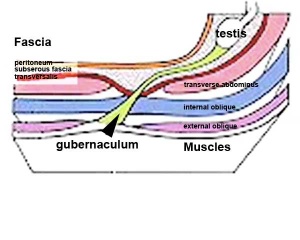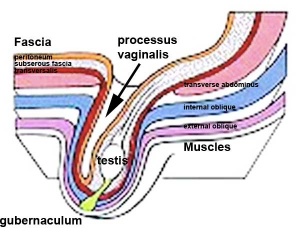Testis Descent Movie: Difference between revisions
mNo edit summary |
mNo edit summary |
||
| Line 13: | Line 13: | ||
==Testis Descent== | ==Testis Descent== | ||
Data from a study of male human fetal (between 10 and 35 weeks) gonad position | Data from a study of male human fetal (between 10 and 35 weeks) gonad position{{#pmid:9649288|PMID9649288}} | ||
* 10 to 23 weeks - (9.45%) had migrated from the abdomen and were situated in the inguinal canal | * 10 to 23 weeks - (9.45%) had migrated from the abdomen and were situated in the inguinal canal | ||
| Line 25: | Line 25: | ||
* Two factors - insulin-like peptide hormone 3 (INSL3) and androgen, have been shown to be involved with gubernaculum development. Insulin-like peptide 3 (INSL3) hormone receptor is RXFP20. | * Two factors - insulin-like peptide hormone 3 (INSL3) and androgen, have been shown to be involved with gubernaculum development. Insulin-like peptide 3 (INSL3) hormone receptor is RXFP20. | ||
'''Human gubernaculum development:''' 8-12 weeks - mesonephric fold at or near the gonad; 20-25 weeks - connected to the testis or uterus. | '''Human gubernaculum development:''' 8-12 weeks - mesonephric fold at or near the gonad; 20-25 weeks - connected to the testis or uterus.{{#pmid:18661576|PMID18661576}} | ||
===References=== | ===References=== | ||
Revision as of 09:33, 25 February 2018
| Embryology - 26 Jun 2024 |
|---|
| Google Translate - select your language from the list shown below (this will open a new external page) |
|
العربية | català | 中文 | 中國傳統的 | français | Deutsche | עִברִית | हिंदी | bahasa Indonesia | italiano | 日本語 | 한국어 | မြန်မာ | Pilipino | Polskie | português | ਪੰਜਾਬੀ ਦੇ | Română | русский | Español | Swahili | Svensk | ไทย | Türkçe | اردو | ייִדיש | Tiếng Việt These external translations are automated and may not be accurate. (More? About Translations) |
| <html5media height="400" width="600">File:Testis_Descent_001.mp4</html5media> | Beginning
End |
Testis Descent
Data from a study of male human fetal (between 10 and 35 weeks) gonad position[1]
- 10 to 23 weeks - (9.45%) had migrated from the abdomen and were situated in the inguinal canal
- 24 to 26 weeks - (57.9%) had migrated from the abdomen
- 27 to 29 weeks - (16.7%) had not descended to the scrotum
Gubernaculum
- mesenchymal structure occurring associated with gonad development and involved in testes descent.
- Two factors - insulin-like peptide hormone 3 (INSL3) and androgen, have been shown to be involved with gubernaculum development. Insulin-like peptide 3 (INSL3) hormone receptor is RXFP20.
Human gubernaculum development: 8-12 weeks - mesonephric fold at or near the gonad; 20-25 weeks - connected to the testis or uterus.[2]
References
- ↑ Sampaio FJ & Favorito LA. (1998). Analysis of testicular migration during the fetal period in humans. J. Urol. , 159, 540-2. PMID: 9649288
- ↑ Niikura H, Okamoto S, Nagase S, Takano T, Murakami G, Tatsumi H & Yaegashi N. (2008). Fetal development of the human gubernaculum with special reference to the fasciae and muscles around it. Clin Anat , 21, 547-57. PMID: 18661576 DOI.
- Female: Ovary Development Movie - MP4 movie | External Genital Movie - MP4 movie | Internal Genital Movie - MP4 movie | Ovary Development | Uterus Development | Vagina Development | Movies
- Male: Testis Development Movie - MP4 movie | External Genital Movie - MP4 movie | Testis Descent Movie - MP4 movie | Penis Development | Testis Development | AMH |Movies
Cite this page: Hill, M.A. (2024, June 26) Embryology Testis Descent Movie. Retrieved from https://embryology.med.unsw.edu.au/embryology/index.php/Testis_Descent_Movie
- © Dr Mark Hill 2024, UNSW Embryology ISBN: 978 0 7334 2609 4 - UNSW CRICOS Provider Code No. 00098G

